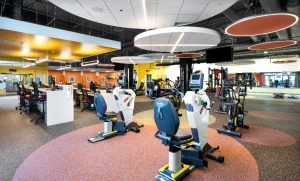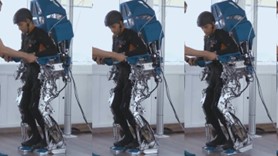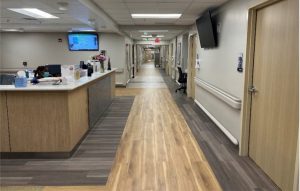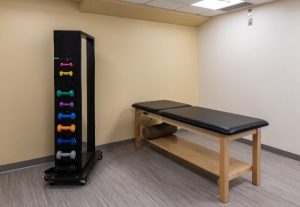Gilbane has deep expertise in building these types of facilities, understanding the intricacies and special features each type of facility can offer to enhance its services. We know that incorporating nuanced design features can help create a healing environment and improve the lives of patients and caretakers alike. Our understanding of key design features, such as providing flexibility to accommodate future rehab technology and equipment, the exterior design to allow people to learn how to maneuver in the real world, or creating an environment that prevents isolation and promotes involvement with the greater patient community, are all part of the value Gilbane’s healthcare team brings to the design phase and construction of these facilities.
Gilbane’s experience building these types of facilities, each with its unique set of parameters, includes:
-

Phoenix Children’s Sports Therapy Clinic PHYSICAL THERAPY – Physical Therapy (PT) helps patients with problems with moving, balancing, walking, and performing other physical activities. PT can also help patients learn to use prosthetic arms or legs, shoe inserts, wheelchairs, walkers, or other assistive devices. Our recent work at Phoenix Children’s Hospital Sports Therapy Specialized Clinics at two locations in Arizona offers nearly 8,000 SF of space for young athletes to throw, hit, run, and cross-train. Both facilities include cardio stations, a quarter basketball court, strength-training workstations, aerobic rebounders, Pilates reformer machines, and an open space for agility and functional training.
- OCCUPATIONAL THERAPY – This helps patients be more independent with self-care and other daily tasks, such as eating, getting dressed, typing, and using the telephone.
- SPEECH THERAPY – This helps patients who have suffered strokes, brain injuries, or other conditions to relearn language skills, such as talking, understanding spoken and written words, and dealing with memory problems. Speech therapy can also help with swallowing problems.
- TRANSFER THERAPY – This refers to alternate methods of moving one’s body from one surface to another, for example, getting in and out of a bathtub or in and out of a car. Safe transfer methods are necessary for independent living and preventing falls and injuries. People with impaired mobility can learn new ways of transferring their bodies to live as independently and safely as possible.
 SCI ROBOTICS – Spinal Cord Injury rehabilitation using exoskeleton rehabilitation equipment, which could be full body or partial.
SCI ROBOTICS – Spinal Cord Injury rehabilitation using exoskeleton rehabilitation equipment, which could be full body or partial.- ACTIVITIES OF DAILY LIVING (ADL) SUITE – The activities of daily living are classified into basic or instrumental. Basic ADLs are those skills required to manage one’s basic physical needs, including personal hygiene or grooming, dressing, toileting, transferring or ambulating, and eating. Instrumental ADLs include more complex activities related to living independently in the community. Gilbane recently completed the inpatient rehabilitation renovation project for the Florida Lake Monroe Hospital. The project involved renovating the 2nd floor unit to expand the adjacent rehabilitation unit to include nine private rehabilitation beds, an OT gym, an ADL Suite, a nurse’s station, and other support spaces. Inpatient therapy services include physical, occupational, and speech therapy to help patients recover and regain their quality of life.
-

Florida Lake Monroe Hospital BRAIN CARE – An injury to the brain can result from trauma, tumor, or disease. Brain injuries often result in physical disabilities as well as significant changes in language, memory, thinking, behavior, and personality. Most brain injury rehabilitation programs provide comprehensive, interdisciplinary care from a team of physicians, therapists, nurses, case managers, and social workers dedicated to expert care. Facilities can include:
-
- Patient rooms, nursing care units, and gym spaces are specifically designed and equipped to meet the unique needs of those with brain injury
- Specialized medical management, nursing, and therapy in a hospital setting
- Individual therapy
- Group treatment

The MetroHealth Rehabilitation Institute of Ohio offers nationally renowned rehabilitation services at Old Brooklyn Medical Center, with the goal to restore function and quality of life to people with significant disabilities. Specific services on this campus include inpatient and outpatient rehabilitation care, clinical training, and research. Gilbane provided both demolition and renovation of the OBC Rehabilitation Institute to reconfigure areas for clinical services including functional electronic stimulation, physical medicine & rehab, a geriatric outpatient rehab, a gait lab, and therapy for stroke patients. The project spans 70,000 SF.
Rehabilitation facilities are a vital part of today’s healthcare system. These specialized facilities help to provide optimal healing environments and services for patients.

